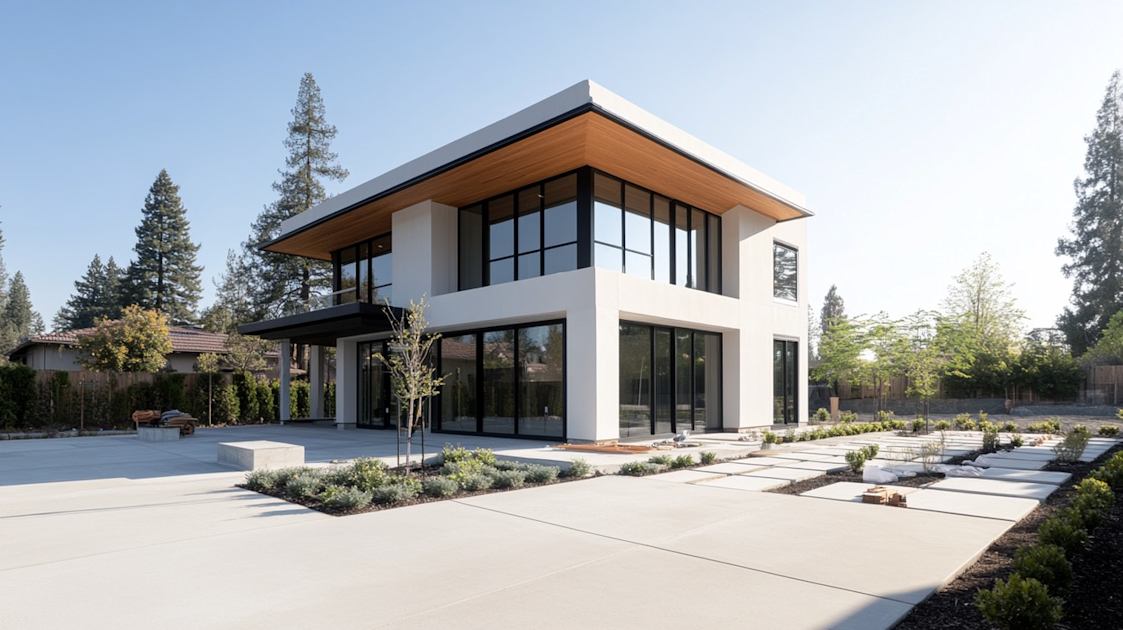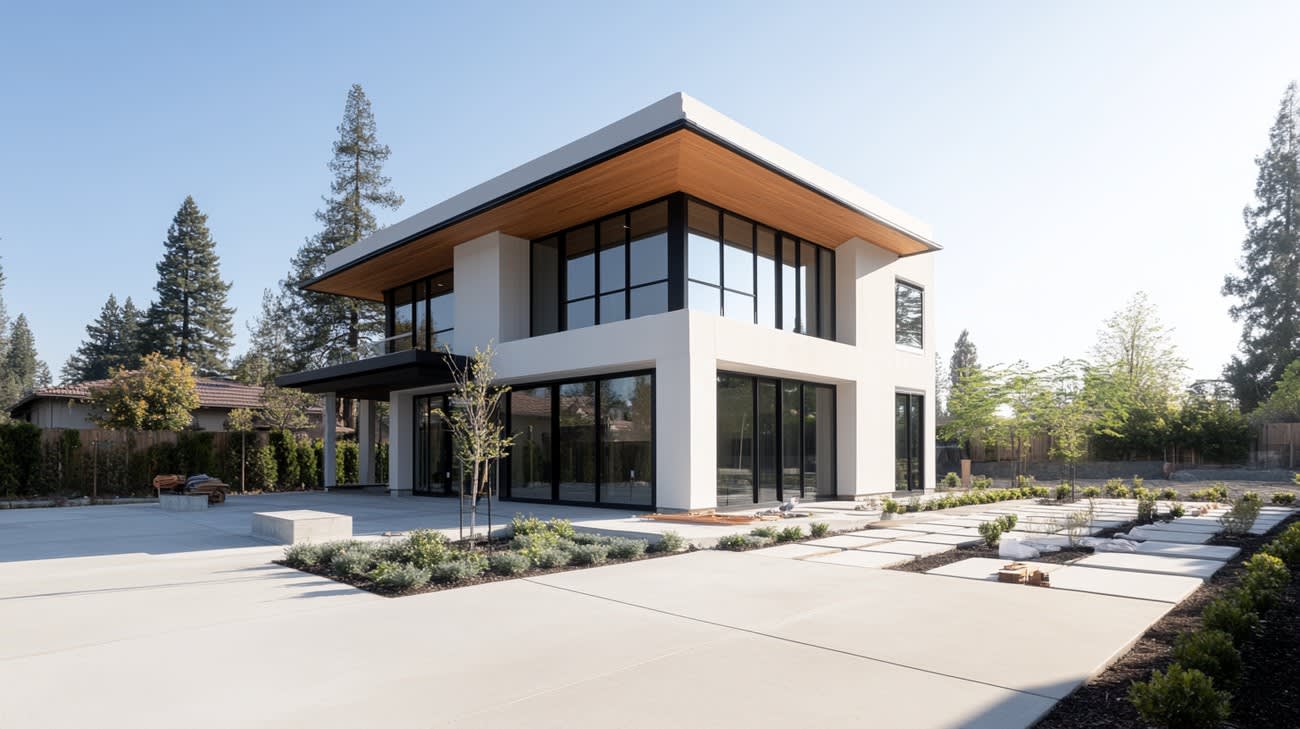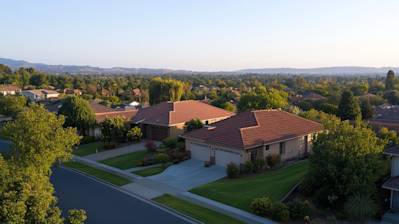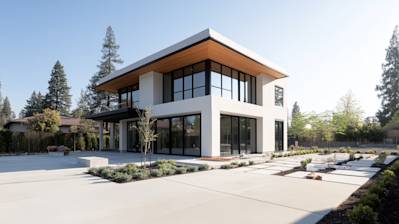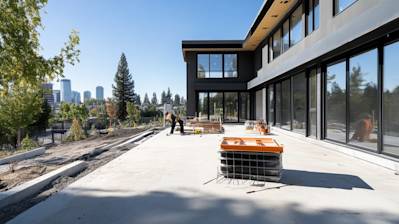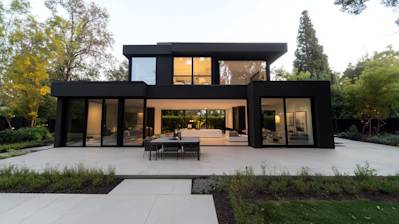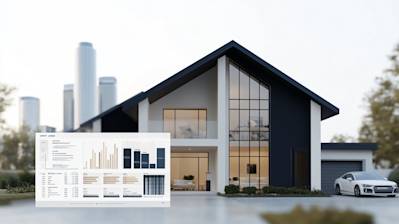Providing a foundation is fundamental for any building, and it's important to choose a sturdy, durable, and eco-friendly foundation. Decades of advancements in the construction field have led to the development of Insulated Concrete Forms (ICF), a reliable and energy-efficient foundation option for your property. Let's delve into what ICF foundations are, their benefits, and how they integrate into building infrastructures.
ICF Foundations: Basics Explored
ICF (Insulated Concrete Forms) foundation is an alternative technique of building foundations, where expanded polystyrene forms are stacked, steel-reinforced, and then filled with concrete. The foam forms remain in place, providing insulation and bolstering energy efficiency.
These are modular units that interlock, similar to LEGO bricks, making them adaptable to build foundations of varying designs and sizes with moisture resistance, improved acoustics, and enhanced structural integrity.
Why Choose ICF Foundation for Your Home?
One may wonder, why choose ICF instead of traditional foundation options? Here are some compelling reasons:
- Superior insulation: ICFs have superior thermal performance, reducing energy costs for heating or cooling systems.
- Greater structural strength: With steel reinforcements and concrete, ICFs withstand wind, fire, and seismic activities, ensuring protection for homes in diverse geographical regions.
- Soundproof features: The foam and concrete combination reduces sound transmission, providing a quieter living environment.
Delving into the Construction Process of an ICF Foundation
The ICF construction process revolves around planning, assembling, reinforcing, pouring, and finishing. Let's break it down:
Planning: Before starting with the actual foundation, site excavation, leveling, and soil compaction take place.
Assembling: The expanded polystyrene (EPS) forms are then assembled on-site, stacked layer by layer. The forms can be custom-made, fitting the exact requirements of the building blueprint.
Reinforcing: Rebar, or steel reinforcement, is arranged within forms as per structural needs. It's used to enhance strength and stability.
Pouring: Concrete is then poured into the forms. Construction crew ensures it’s evenly distributed and there are no voids left within the ICFs.
Finishing: After curing, surface finishing can be applied as per aesthetic or climatic needs. This could involve installing exterior siding or stucco.
Illuminating ICF Foundation Cost Factors
ICF foundation costs may vary and are influenced by several factors:
- The design complexity of the foundation
- The geographical landscape and soil type
- The type of concrete and reinforcement used
- Skilled labor charges
While initial costs may exceed traditional building methods, overall lifetime savings in energy and maintenance costs make ICF a cost-effective choice.
Sounds Great, but Is ICF Foundation Right for Your Home?
Consider the following before opting for an ICF foundation:
- Building codes: Ensure that your local building codes permit the use of ICF. It's accepted widely, but it's always safe to check.
- Climate: ICFs excel in energy efficiency and tend to show greatest financial benefits in regions with extreme temperatures.
- Future Plans: If your future plans include potential expansion or changes in the building structure, using ICFs for its adaptability might be a smart choice.
Every foundation method has its unique points and it is vital to select what is best suited for your specific conditions.
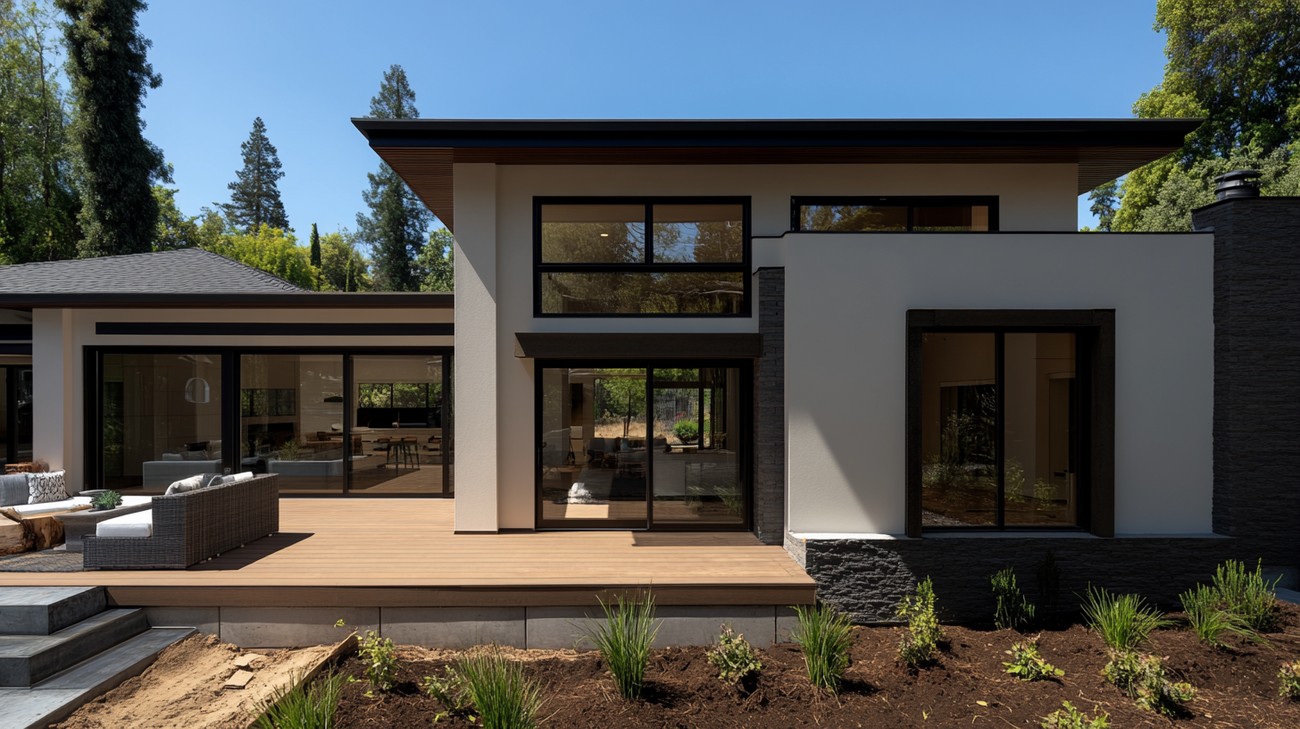
Frequently Asked Questions about Icf Foundation
How is an ICF foundation built?
The ICF foundation construction process begins by digging and leveling the site. A footer is poured, and the ICFs are stacked on top, creating a hollow space that's filled with reinforced concrete. The ICFs create a secure mold for the concrete, providing an insulating layer on both sides.
What are the main elements of an ICF foundation?
The ICF foundation system consists mainly of the reinforced concrete core and the ICF. Other elements include the footing, reinforcement bars (rebars), waterproofing membrane, and drainage system.
How does an ICF foundation enhance energy efficiency?
ICF foundations provide superior thermal insulation compared to traditional concrete foundations. The foam insulation forms an effective barrier against cold winters and hot summers, minimizing the need for additional heating or cooling.
How does an ICF foundation contribute to soundproofing?
Besides thermal insulation, ICF foundation also offers excellent acoustic insulation. The combination of concrete and foam helps absorb and reduce sound transmission, providing a quieter and more peaceful living environment.
How durable is an ICF foundation?
ICF foundations are remarkably durable and resistant to most natural disasters. They can resist high winds, earthquakes, and even fires for several hours, offering improved safety and peace of mind for homeowners.
What is the lifespan of an ICF foundation?
An ICF foundation is extremely long-lasting. It can effortlessly outlive the life expectancy of a traditional wood frame structure, providing stable support for your home for many decades.
Is it more expensive to install an ICF foundation?
While the upfront cost of ICF foundations can be higher than traditional foundations, they can result in significant savings over time due to decreased utility costs and low maintenance requirements.
Can ICF foundations be eco-friendly?
Indeed, ICF foundations are very eco-friendly. By reducing energy usage, ICFs reduce the house’s carbon footprint. Additionally, the materials used in ICFs are non-toxic and generate less waste than conventional construction methods.
How do I maintain an ICF foundation?
ICF foundations require minimal maintenance. Regular inspections to check for cracks or damages and maintenance of the drainage system are mostly sufficient to ensure the longevity of the foundation.
Do ICF foundations provide better indoor air quality?
Due to their superior insulation properties, ICF homes offer excellent indoor air quality. The continuous insulation helps reduce air leakage and infiltration of mould, dust and allergens, thus providing a healthier living environment.
Can ICF foundations be used in any type of climate?
ICF foundations are versatile and adaptable to a wide range of climate conditions. Their insulation properties make them ideal for both extremely cold and hot climates.

Pros of ICF Foundations
Energy Efficiency
Lower Energy Bills
ICF foundations provide excellent insulation, which often results in significantly lower energy costs. The high thermal mass of the concrete walls helps to maintain a steady indoor environment, reducing the need for heating and cooling systems. For homeowners and builders who are prioritizing energy efficiency and sustainability, ICF can be an excellent choice.
Eco-Friendly
Since ICF foundations can reduce energy usage, they can indirectly decrease carbon emissions which are harmful to the environment. Moreover, the materials used in ICF foundations are often sourced from recycled materials, adding to their environmental credentials.
Durability and Longevity
Resistance to Natural Disasters
ICF foundations are designed to withstand extreme scenarios such as earthquakes, fires, and hurricanes, which conventional building methods may not. The high strength of the concrete and the resilient foam interlock to create a rigid structure that can endure high stress without failing. This resistance can save homeowners significant costs and stress in terms of repairs and insurance premiums.
Pest and Mold Resistant
The materials used in ICF foundations are not attractive to pests like rodents or termites and they do not provide a conducive environment for the growth of mold. This can increase the lifespan of the building and decrease maintenance costs associated with pest control and mold remediation.
Noise Reduction
ICF foundations have excellent noise reduction capabilities. This is due to the insulation provided by the thick layer of foam, which can absorb sound waves. For properties near busy roads, rail lines, or industrial areas, an ICF foundation can significantly help in reducing noise pollution.
Cons of ICF Foundations
Cost
Higher Initial Cost
The cost of an ICF foundation is usually higher than a conventional concrete or wood foundation. This is due to the specialized materials and skills needed to construct an ICF foundation. However, it should be noted that this upfront cost may be offset in the long run through energy savings and reduced maintenance costs.
Cost of Errors
Installation errors can be quite costly to fix with ICF foundations. This is because it’s difficult to alter or fix an ICF wall once it’s been built. You can’t just hammer a nail into it or cut it as easily as a wooden wall. Therefore, it’s critical to ensure the work is done correctly from the start.
Limited Builder Knowledge and Availability
Finding builders with ICF expertise can be a challenge. Many are comfortable with traditional methods and may not have the necessary training or experience to properly work with ICF. This can limit your options in terms of contractors and could potentially increase the cost and time required for the construction.
Design Limitations
While ICF foundations are quite versatile, they may not be suitable for all designs. For instance, it can be more difficult to incorporate intricate architectural designs and features into an ICF foundation. Furthermore, making changes after the foundation has been built can be challenging and costly.
Potential Moisture Issues
In some scenarios, ICF foundations may be more prone to moisture issues. This can happen if the exterior foam insulation allows water to penetrate and doesn’t allow the wall to dry out quickly. These moisture issues can then lead to mold and mildew growth, which can be harmful to the occupants and damage the structure over time. Proper waterproofing is, therefore, crucial when building with ICF.

Myths / Misconceptions about ICF Foundations
Myth 1: ICF Foundations are Only for Cold Climates
A common misconception is that Insulated Concrete Forms (ICF) foundations are only meant for cold climates. It's important to debunk this myth because it may prevent homeowners and builders from using ICF in climates where they could provide several benefits.
Reality
ICF foundations are perfect for any climate, not just the cold ones. They're excellent at insulating houses from extreme weather conditions, whether it's below-zero winters or scorching summers. In hot regions, ICFs can keep the inside temperatures cool, thus saving on air-conditioning costs. Similarly, in colder areas, they can retain heat, reducing the need for heating systems.
Myth 2: ICF Foundations are Overpriced
Some people might refrain from using ICF foundations thinking they are too expensive compared to traditional wood-frame construction.
Reality
While the initial cost of setting an ICF foundation might be higher, the long-term savings outweigh the upfront costs. These energy-efficient foundations reduce the cost of heating and cooling, providing savings over time. Additionally, ICFs are much more durable, saving on maintenance and replacement costs in the long run.
Myth 3: Building with ICFs is Time-consuming
Another misconception is that the construction process of an ICF foundation is time-consuming as compared to traditional methods.
Reality
Contrary to this belief, building with ICFs is usually faster than conventional construction methods because there's no need for additional insulation or drywall. The forms interlock like Lego blocks, significantly speeding up the construction process.
Myth 4: ICFs are Prone to Water Damage
A common myth about ICF foundations is that they're susceptible to water damage, leading to mold growth.
Reality
ICFs are actually highly resistant to water damage because of the waterproof foam they consist of. Any water that seeps into an ICF wall will not damage the form itself. Moreover, ICFs do not provide an organic food source for mold, making them resistant to mold growth.
Myth 5: ICF Foundations are a Fire Hazard
Many people wrongly believe that ICF foundations are a fire hazard because the insulation foam might catch fire.
Reality
ICF walls have a high fire resistance. Generally, the foam used in them is treated with fire retardants, which significantly slow the spread of fire. Also, the concrete within has an excellent fire resistance rating.
Myth 6: ICF Foundations Limit Architectural Design
There's a myth that ICF foundations restrict the architectural design of a building.
Reality
ICF construction offers incredible design flexibility. Walls can be curved, angled, or straight. ICFs can incorporate large window openings or long, unsupported wall spans. Builders can achieve any look, from modern to classic, with ICF construction.
Debunking these misconceptions can help builders and homeowners make informed decisions when considering ICF foundations for their buildings. From energy efficiency and lower long-term costs to versatility and durability, ICF foundations provide a wealth of benefits that deserve serious consideration.
Summary
Looking to invest in a long-lasting, energy-efficient, and eco-friendly way to construct your home? The ICF foundation might be the answer for you. Known for its durability and high insulation properties, these foundations are rapidly becoming popular among environmentally conscious property owners. Investing in an ICF foundation means you'll be spending less on heating and cooling costs, and that's something worth considering.
Not only are ICF foundations a smart choice financially and ecologically, they also offer peace of mind. These foundations are fire-resistant, wind-resistant, and termite-resistant. Safety is key when it comes to your home, and with an ICF foundation, you can rest easy knowing your home is built to last and withstand a variety of harmful factors. It's a comforting thought, right?
Finally, don't underestimate the benefits of ease and efficiency when it comes to building an ICF foundation. Compared to traditional concrete forms, ICF is simpler to install and more versatile. This means your construction process could be faster and smoother, with fewer reasons to stress. So, why not make the smart and sustainable choice? Choose an ICF foundation for your next project and experience the difference yourself.
About HouseIdea
HouseIdea, based in sunny Sacramento, CA, is your one-stop-shop for all things home improvement. We're a bunch of home-design lovers who's all about turning your house into the home you've always dreamed of. Whether you're looking to renovate your kitchen, revamp your living room, or transform your backyard, we've got you covered. Our team is passionate about providing you with high-quality, creative, and practical solutions by marrying aesthetics with functionality. At HouseIdea, we make your home improvement journey a breeze by offering top-notch consultation, unparalleled customer service, and access to the latest trends. Living by the belief that "A house is made with walls and beams; a home is built with love and dreams," we aim to bring your dream home to life - one project at a time. Now, that's what we call 'HouseIdeas'.
Tags: insulated concrete forms, building foundation, construction technology,

